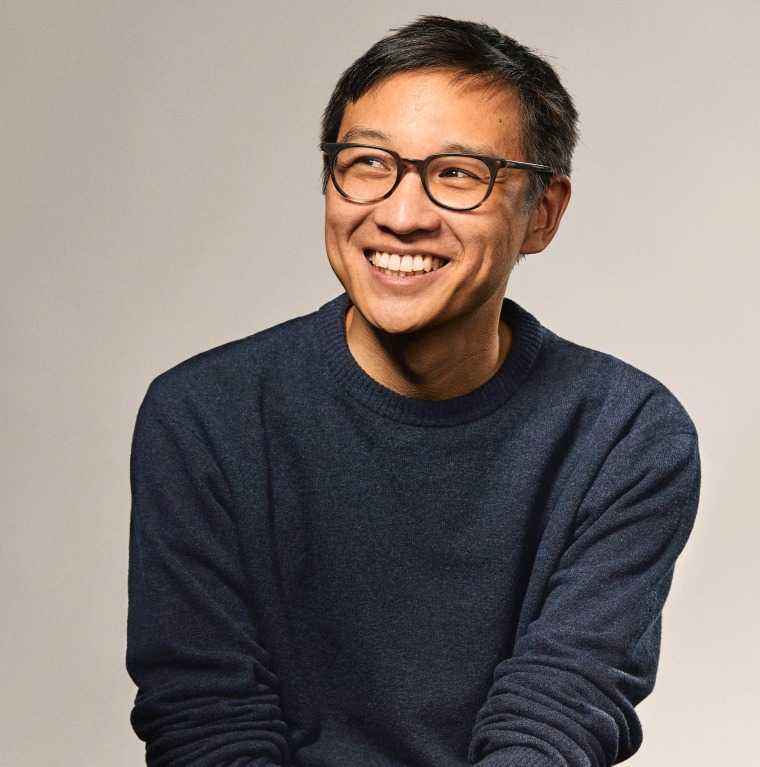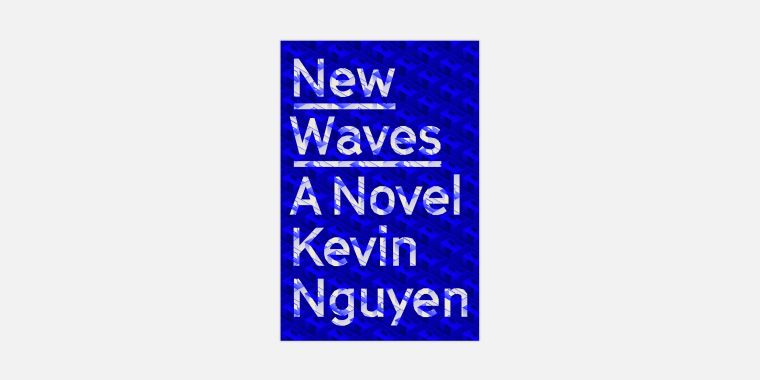While Kevin Nguyen is best known for his reporting on culture and technology for sites like The Verge — where he is the features editor — a decade ago he was one of the many new college grads trying to build careers in the tech world.
"I worked at a bunch of dinky startups for no money," Nguyen told NBC Asian America, adding that he later worked for giants Amazon and Google. "It was just this sort of long, circuitous path. Some of the jobs were good, and some of the jobs were less good."

That journey through the startup world served as part of the inspiration for Nguyen's debut novel, "New Waves," which is set to be released Tuesday by One World. "New Waves" tells the story of Lucas, a young Asian American customer service representative, and his close friendship with Margo, a black software engineer.
The pair quickly come to the realization that the buzzy startup they work for is undervaluing them. As a way to seek revenge, they begin to plot how they can steal vital user data and create a rival company. Everything seems to be going swimmingly until Margo dies suddenly in an accident — leaving Lucas to face the consequences of both their plan and Margo's secrets on his own.
We had the chance to chat with Nguyen about his new novel, ethics in the tech world and just how tricky it is to navigate startup culture as a young worker.
NBC Asian America: Lucas is a 20-something Asian American working in tech. A consequence of that is that everyone thinks he's an engineer, but he is really in customer service. What was interesting to you about exploring the world of tech from someone on the outskirts?
Kevin Nguyen: There's this assumption that people who work in tech are all well-paid engineers, but just like in any company, there is a lower class of worker doing customer service or quality assurance or any number of menial jobs. A lot of them might not even be full time.
The book deals with a lot of the assumptions that come with privilege and power. The arc for Lucas is that he has spent his whole life as an Asian American man feeling powerless in a lot of ways. He doesn't come from a wealthy family, and he didn't go to a four-year college.
But as he moves up in the company a little bit, he makes certain decisions that are largely irresponsible or immoral. They are just small things, and then they have bigger repercussions, and he's reckoning with that.
NBC Asian America:Margo works with Lucas, and she struggles with both racism and sexism at work as a black woman in tech. Why did you want the friendship between Lucas and Margo to be such a major part of the book?
Nguyen: I liked the idea of taking a look at a friendship between two people who have very different life experiences. I find that you don't find those friendships as much in literature or in TV or film as what exists in the real world. I just feel like that no one in New York has friends where everyone just looks like them, or at least I hope they don't.
But even though they are very good friends and care about each other, they still don't understand each other's experiences, and they are not great at empathizing. On one hand, Lucas is powerless at work and Margo says, 'Oh yeah, me, too.' But Margo is actually an engineer, and she has the privilege of making a good salary. On the other hand, Lucas doesn't understand how she feels powerless at work as a black woman.
NBC Asian America:The app Lucas and Margo work on was originally created to help journalists and political dissidents communicate freely. But once it launches, it is immediately adopted by teens as a way to cyberbully each other. That seems like the perfect metaphor for tech in a lot of ways.
Nguyen: I liked the idea of teens using the app because teens define a large swatch of how the internet is used. They define the internet more than, for example, blue-check Twitter users do.
But I actually do think tech founders think they are doing good things in the world. They have high-minded ideas of what technology can do.
I also think that these are not stupid people. They are not that naive. As soon as the growth numbers stop, they are going to be making more realistic decisions about their businesses. The first thing to go is that bright-eyed optimism.
NBC Asian America:You write on your book's website that you began writing "New Waves" on the Notes app on your phone while on the subway. How exactly did that process work?
Nguyen: I'm someone who gets kind of anxious on the subway, especially when it is crowded. So when it's too crowded to read a book, I'll just write on my phone.
I was working in tech at the time, so I would write things about what would go on at work or I would write concepts for sci-fi stories. I just did that for a few months all in one note on my Notes app, and at one point that note got so big that it crashed the app. So I copied and pasted everything into Google Docs, and it turned out that I had written 20,000 words. When I gave it a read-through, there were some parts I just really liked and I thought, "There's something there."
NBC Asian America:What do you ultimately want readers to take away from your book?
Nguyen: The book has characters that live with a lot of things. They live with technology, they live with racism, they live with those things conflated. I just want people to get into the book and just know what it is like to live with those things and know what it's like to swim in that messy pool.
This interview has been edited for length and clarity.
